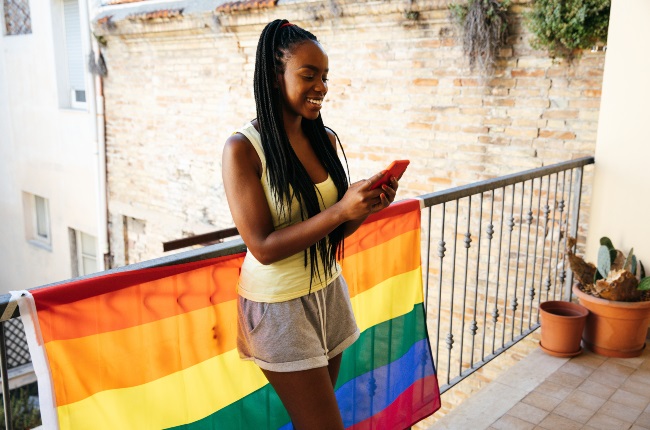
- June is international Pride Month, where the global LGBTQ+ community celebrates their respective identities and freedom to be comfortable in their sexualities.
- Whether you're still figuring it out or secure in your identity, this month is a chance to feel seen and heard.
- For the allies of the community, consider this guide an opportunity to further educate yourself.
What do you call yourself if you don’t identify with a certain gender identity or sexual orientation? What do you call someone who doesn’t identify as cisgender or straight without hurting them? How do you learn all these new terms that you’re unfamiliar with?
Well, it’s simple really – educate yourself. And not just during Pride Month, but throughout the year.
You can learn terms and descriptions and read all about how to treat those who are part of the LGBTQ+ communities, but you also need to apply this knowledge in a practical sense and actually treat your family, friends, colleagues and social media mutuals in a respectable manner and learn what is okay and what isn’t.
READ MORE: 6 women on why they prefer the term ‘queer’
Being socially aware doesn’t mean you immediately get a pass as being a good person or thinking that you’re immune from learning anything. It actually means constantly teaching yourself new ways of thinking and learning from the marginalised around you and how to better understand their circumstances and your own. We've seen this in terms of allyship over the events of the past couple of days, thanks to the #BlackLivesMatter movement. The same way black people have called on white people to educate themselves on racial injustice, is the same way the LGBTQIA+ community expects us to show up, respect and protect them.
For example, Dr Eli Rosen, sex educator and healthcare activist at Sexy Smarts, says "The easiest way to be considerate of a transgender person’s identity is to respectfully ask them which name and pronouns they’d like you to use for them. Some people want to be referred to as he or she while other people may use singular they.
"If you’re worried about messing up, try practicing when you’re alone, and if you do mess up just apologise and do better next time," she says.
"It’s normal to be curious about all the things that make LGBTQ+ people different from cishet (cisgender heterosexual) people, however it is never okay to ask a gay or lesbian couple how they have sex or “who’s the man and who’s the woman”. Please don’t ask invasive questions about transgender or intersex people’s bodies, genitals or surgeries, it’s none of your business."
So, as a starting point, here’s a list of definitions you should know and some that may help you find your identity too:
Questioning
Used for a person who is unsure of their gender identity or sexual orientation.
Sexual orientation
A combination of physical, romantic and emotional attractions that determine who people want to have relationships or engage in sexual activity with.
Physical attraction
The desire to share sexual intimacy with a person
Emotional attraction
The desire to share emotional vulnerability with a person
Romantic attraction
The desire to have a relationship with a person
Straight (heterosexual)
A person who has other gender attractions. For example; men who are attracted to and want to form relationships with women, and women who are attracted to and want to form relationships with men.
READ MORE: This transgender man wants you to stop being ashamed of your period
Lesbian
A woman who is physically, emotionally, and/or romantically attracted to and wants to have sex and/or form relationships with other women.
Gay
A man who is physically, emotionally, and/or romantically attracted to and wants to have sex and/or form relationships with other men.
READ MORE: How ‘allyship’ can make LGBT+ staff feel less excluded in the work place
Bisexual
A person who is physically, emotionally, and/or romantically attracted to and wants to have sex and/or form relationships with someone of the same gender or another gender. Bisexual people do not necessarily have equal levels of attraction to various genders. Bisexual people also do not necessarily want to have relationships with men, women, and/or other genders at the same time, nor are they more likely to cheat on their partners.
Pansexual
People whose attractions to other people are not limited or influenced by the person’s gender or expression. This means that pansexual people can be attracted to people regardless of whether they are men or women, cisgender or transgender, or any other gender identity.
Queer
A person whose sexual identity rejects heteronormative relationship models. People who use the word queer may have multiple identity descriptors that fall within the LGBTIAQ+ acronym.
Please note: This term is most used by younger people and people can self-identify as queer, but it is a reclaimed slur and should not be used for people unless they have explicitly claimed it for themselves.
Asexual
A person who does not experience physical attraction.
Demisexual
A person who does not experience physical attraction to another person unless they form a strong emotional connection.
Grey-asexual
Grey asexuality can be hard to understand because of its broad definition. It encompasses people who identify strongly with asexuality, but don’t feel like asexual is the most correct word for them. There are many possible definitions and identities under the gray asexual umbrella, but here are some of the most commonly seen ones:
- feels sexual attraction infrequently, of low intensity, to few people, or in specific circumstances
- feels sexual attraction, but has no desire to act on it
Skoliosexual
This term refers to people who are attracted to people who are transgender or nonbinary.
Androgyne
Androgynes have a gender which is simultaneously feminine and masculine, although not necessarily in equal amounts.
Homoromantic
A person who is romantically attracted to a member of the same sex or gender.
Aromantic
A person who experiences little or no romantic attraction to others.
Bigender
A person who identifies as two or more genders.
Agender
A person who does not identify with any gender.
Sex assigned at birth
The assumptions made about an infant’s gender based on the observation of their external genitals at birth.
A penis results in an infant being assigned male at birth.
A vulva results in an infant being assigned female at birth.
Intersex
Intersex refers to people who are born with genetic, hormonal or physical sex characteristics that do not fit the medical definitions of male or female. In South Africa there is no way to legally recognise people who are intersex and intersex infants are still assigned male or female at birth.
Gender
A person’s personal understanding of what it means to be male, female, or something else, based on their understanding of their own identity, as well as the influence of all the gender messages they have experienced in their lifetimes.
Binary
A word meaning “two of” used to describe social understandings based on the two common genders; either male or female
Cisgender (cis)
A person whose gender aligns with gender characteristics associated with the sex they were assigned at birth.
Transgender (trans)
A person whose gender differs, in part or entirely, with gender characteristics associated with the sex they were assigned at birth.
Transgender is an umbrella term that describes many different gender identities. Some transgender people will take hormones or have surgeries to help align their bodies with their gender, but not all transgender people are able to or want to take these steps. Being transgender is not dependent on physical appearance or surgery.
READ MORE: Inquiry into LGBTQ+ hate crimes could improve how police and communities respond
Nonbinary
An umbrella term for transgender people whose gender is something other than male or female. Some nonbinary gender terms include; agender, bigender, polygender, demigender, genderfluid
Gender Non-conforming
A person who doesn't conform to the gender assigned at birth or any gender.
Genderqueer
A term used to describe someone whose gender identity, political understanding or interaction with gender cannot be limited to male or female. Genderqueer people may or may not identify as transgender.
Gender fluid
Gender-fluid is a nonbinary gender identity that's not fixed and is capable of changing over time.
Sexually fluid
According to Psychology Today, sexual fluidity is "commonly understood as an individual’s capacity for fluctuation in their sexual response as a result of different situations or interpersonal and contextual experiences."
Pansexual
Attraction that is not limited to gender or sexual orientation.
Transsexual
a person who emotionally and psychologically feels that they belong to a different sex than the one assigned at birth.
Omnisexual
An individual who is attracted to persons of all genders and orientations.
To further educate yourself, visit the LGBTQ Pride Month and Education Resources site here.
Follow us on social media: Facebook, Twitter, Instagram
Sign up to W24's newsletters so you don't miss out on any of our stories and giveaways.




 Publications
Publications
 Partners
Partners












